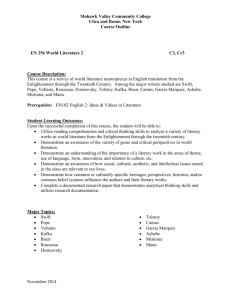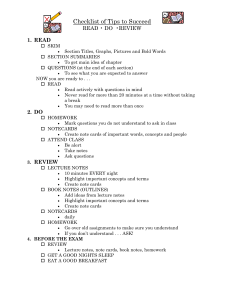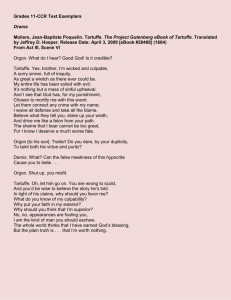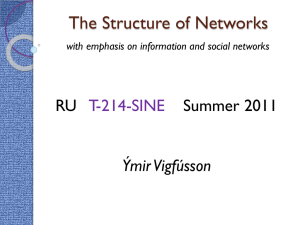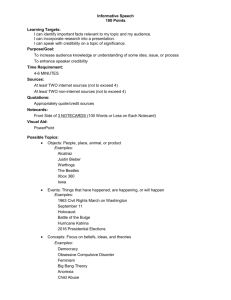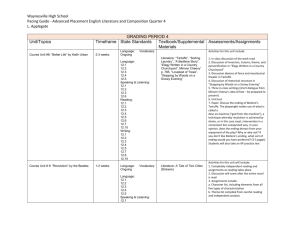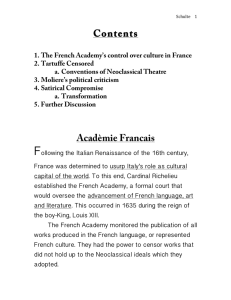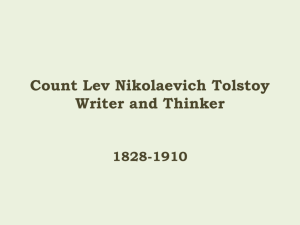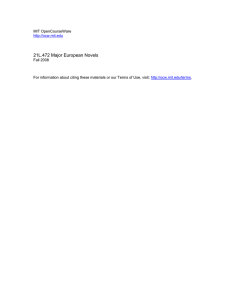Syllabus - Texas A&M University
advertisement
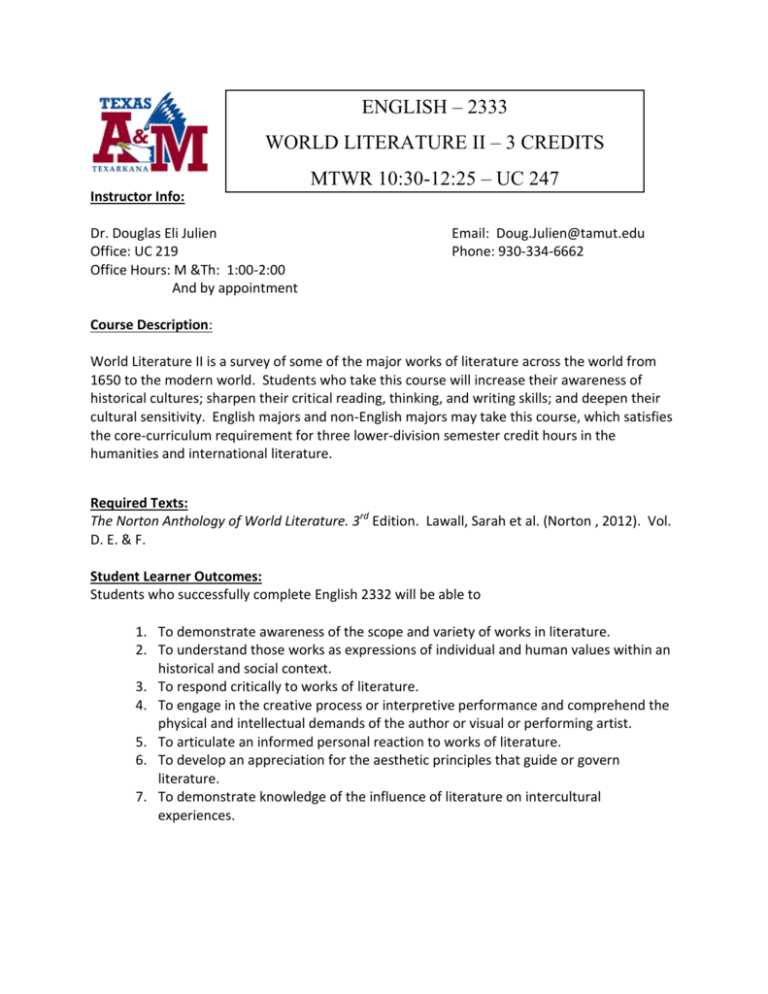
ENGLISH – 2333 WORLD LITERATURE II – 3 CREDITS MTWR 10:30-12:25 – UC 247 Instructor Info: Dr. Douglas Eli Julien Office: UC 219 Office Hours: M &Th: 1:00-2:00 And by appointment Email: Doug.Julien@tamut.edu Phone: 930-334-6662 Course Description: World Literature II is a survey of some of the major works of literature across the world from 1650 to the modern world. Students who take this course will increase their awareness of historical cultures; sharpen their critical reading, thinking, and writing skills; and deepen their cultural sensitivity. English majors and non-English majors may take this course, which satisfies the core-curriculum requirement for three lower-division semester credit hours in the humanities and international literature. Required Texts: The Norton Anthology of World Literature. 3rd Edition. Lawall, Sarah et al. (Norton , 2012). Vol. D. E. & F. Student Learner Outcomes: Students who successfully complete English 2332 will be able to 1. To demonstrate awareness of the scope and variety of works in literature. 2. To understand those works as expressions of individual and human values within an historical and social context. 3. To respond critically to works of literature. 4. To engage in the creative process or interpretive performance and comprehend the physical and intellectual demands of the author or visual or performing artist. 5. To articulate an informed personal reaction to works of literature. 6. To develop an appreciation for the aesthetic principles that guide or govern literature. 7. To demonstrate knowledge of the influence of literature on intercultural experiences. Delivery and Assessment Methods: Delivery 1. Class lectures and discussion Assessment 1. Two in-class exams 2. Participation in class sessions 3. Two analytical papers Course Requirements and Methods of Evaluation: 1. In-class exams (3) A. There are two in-class exams that must be completed during the summer session. Each exam will consist of two parts. The first part will be a test of literary terminology, historical events, and geography. The second part will ask for author and title identification, short-answer questions based on interpretation and terms, and an essay question. Students will answer in as much detail as possible by supporting their answers with the material presented in the course. The final is comprehensive. B. Each exam is worth 200 points for a total of 400 points. 2. Participation in class sessions A. You will need a healthy stack of 3 X 5 notecards. At the break and end of each class, you will be evaluating the day that was and have this as a venue to ask questions that you were afraid to ask, critique what just happened, tell me how wonderful or dismal I am—they basically become your ballots on the course. More on this when it comes time to “vote.” This will be your participation score, so things like “no comment” and “I hate these notecards” will not garner you participation points. B. Each card is worth 5 points and will be turned into a percentage for 100 points. 3. Analytic Papers (3) A. Students will prepare two analytic papers comparing different cultures from the syllabus. A specific rubric will be given at the time of the assignment; however, generally the text should provide a comparison of two works utilizing literary terminology and will be at least 5 pages long. B. Each paper is worth 200 points for a total of 400 points. Grading Scale: A= B= C= D= F= 90% – 100% 80% – 89% 70% -- 79% 60% -- 69% 0% -- 59% Complete Course Schedule: Week #1: 7/8 – Introduction to the Me and the Course and Descartes: From The Discourse on Method 110-113 7/9 – Voltaire: Candide 355-413 Papers Assigned 7/10 – De Sade: From Philosophy in the Bedroom 137-140 Continue Voltaire Week #2: 7/14 – Moliere: Tartuffe 144-197 7/15 – Diderot and D’Alembert: From The Encyclopedie 113-127 Continue Tartuffe 7/16 – Baudelaire: All selections 468-489 De Gouges: The Rights of Woman 24-28 7/17 Bunina: Selections: 384-387 Kant: What is Enlightement? Week #3 7/21 – Midterm Exam 7/22 – Tolstoy: The Death of Ivan Ilyich Burke: From Reflections on the Revolution in France 29-36 7/23 – Hume: From Of National Characters Continue Tolstoy 7/24 – Kafka: The Metamorphosis 207-241 U.S. Declaration of Independence 18-21 Declaration of the Rights of Man and of the Citizen 21-23 Paper #1 Due Week #4: 7/28 – Dessalines: Liberty or Death: Proclamation to the Inhabitants of Haiti 36-40 Continue Kafka 7/29 – Borges: The Garden of Forking Paths 487-496 7/30 – Continue Borges 7/31 -- Salih: “The Doum Tree of Wad Hamid” 815-824 Week #5: 8/4 – Continue Salih 8/5 – Marquez: Death Beyond Constant Love 988-993 8/6 – Continue Marquez 8/7 – Final Exam Paper #2 Due Student Participation: This is an interactive course. Professional and courteous communication is always expected. There is no attendance policy for the course. My job is to teach you each class, make it interesting and vital to you whenever I can, and make coming to class, at the very least, seem necessary. Your job is to come or keep up when unable. Three caveats. The first caveat I would add is that I will work as hard as I possibly can to make sure that if you’re not attending class regularly, it will be very difficult to do well—that is also my job. The second is that I’m not interested in trying to repeat a day, week, or month of what happened in my office—class is unrepeatable. The final caveat is that there is a participation component to your grade, and it is difficult to participate if you are not here. Disability Accommodations: Students with disabilities may request reasonable accommodations through the A&MTexarkana Disability Services Office by calling 903-223-3062. Plagiarism Policy for the English Department: Any student who plagiarizes work in an A&M-Texarkana English class will automatically fail that English class. Academic Integrity: Academic honesty is expected of students enrolled in this course. Cheating on examinations, unauthorized collaboration, falsification of research data, plagiarism, and undocumented use of materials from any source constitute academic dishonesty and may be grounds for a grade of ‘F’ in the course and/or disciplinary actions. For additional information, see the university catalog. Statement on email usage: Upon application to Texas A&M University-Texarkana an individual will be assigned an A&MTexarkana email account. This email account will be used to deliver official university correspondence. Each individual is responsible for information sent and received via the university email account and is expected to check the official A&M-Texarkana email account on a frequent and consistent basis. Faculty and students are required to utilize the university email account when communicating about coursework. Student Technical Assistance: Solutions to common problems and FAQ’s for your web-enhanced and online courses are found at this link: http://www.tamut.edu/webcourses/index.php?pageid=37 If you cannot find your resolution there, you can send in a support request detailing your specific problem here: http://www.tamut.edu/webcourses/gethelp2.php Blackboard Helpdesk contacts: Office hours are: Monday - Friday, 8:00a to 5:00p
